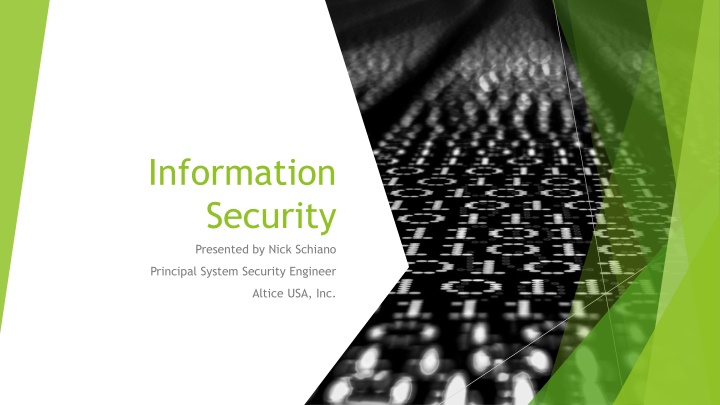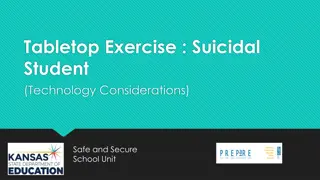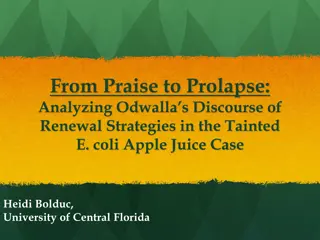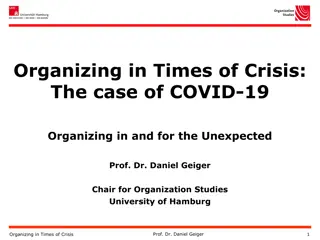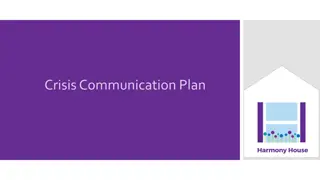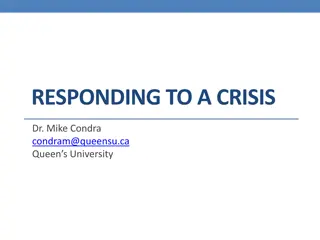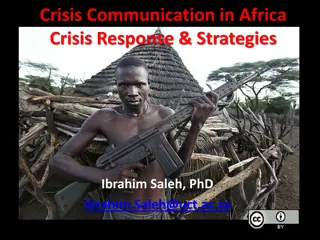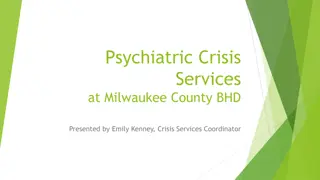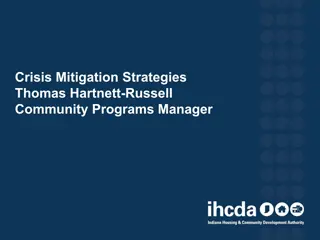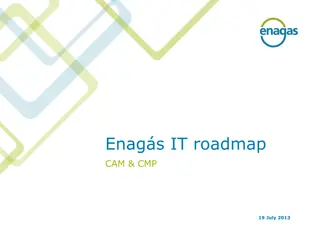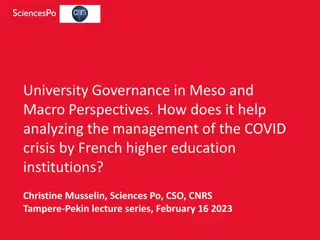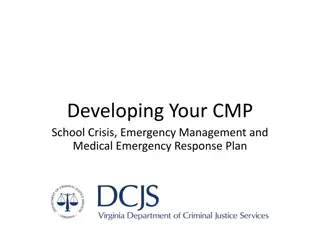Developing Your CMP School Crisis Management Plan
Establish a comprehensive Crisis, Emergency Management, and Medical Emergency Response Plan for schools. This plan covers critical phases of emergency management and aligns with legal requirements and nationally recognized best practices. It includes important considerations, required information, purpose, goals, and scope, legal authority, and planning team collaboration.
Download Presentation

Please find below an Image/Link to download the presentation.
The content on the website is provided AS IS for your information and personal use only. It may not be sold, licensed, or shared on other websites without obtaining consent from the author.If you encounter any issues during the download, it is possible that the publisher has removed the file from their server.
You are allowed to download the files provided on this website for personal or commercial use, subject to the condition that they are used lawfully. All files are the property of their respective owners.
The content on the website is provided AS IS for your information and personal use only. It may not be sold, licensed, or shared on other websites without obtaining consent from the author.
E N D
Presentation Transcript
Information Security Presented by Nick Schiano Principal System Security Engineer Altice USA, Inc.
Information Security What is it? Information security, which you might hear referred to as Infosec, is the practice of protecting information by mitigating information risks. It is part of information risk management and an important function for any company. Information Security involves mastering the processes and methodologies with keeping information confidential, available, and assuring its integrity. We refer to this as the Information Security Triad.
A day in the life of a Principal Security Engineer Perform Health Checks on Critical Security Systems Check our Service Desk application for any new or critical issues reported Work on projects to implement new information security controls Firewall Projects Intrusion Detection Projects Denial of Service and Distributed Denial of Services Projects Work on projects to support our business Security Design Review Security Risk Assessment Data Security Control Standards Assessment Compliance Review
Education and Training for an Information Security Professional Formal Education Continuing Education High School Diploma CompTIA Security+ Bachelor s Degree in Computer Science, Information Security, Cybersecurity Associate of ISC2 Certified Information Systems Security Professional Also minor in Business Management or Economics or other Business courses Certified Cloud Security Professional Currently pursuing my Master s Degree in Cybersecurity with a concentration in IT Management
Our Information Security Team Network Security Group System Security Group Firewalls, Identity Management Intrusion Prevention Access Management Distributed Denial of Service Prevention Data Security Management Content Management Vulnerability Scanning Risk Assessment
How did I find my current role as a Principal Security Engineer? When I started my career, I was not a security engineer. I started out as a System Administrator. But a chance encounter set me on the path to become an Information Security Professional 22 years ago, and I have been at it ever since. Not everyone starts out Information Security professional. Some people start out as Network or System administrators and progress to Infosec jobs and roles. The key to finding a role in InfoSec as an Engineer Understand how to evaluate risk Information Security is all about making risk decisions in just about every aspect of the job. Be technical. Some Security Professions don t require hand-on technical experience, but from my perspective in the industry for 22 years, having firsthand technical knowledge is key to landing a successful Information Security role.
Advice to get start in Information Security Use Google to search for Information Security, Network Security and Cloud Security newsletters, news site, online magazines and other sources Post Graduation, continuing education is important in Information Security. Having a highly recognized and comprehensive set of credentials is a key factor to obtaining a job in Information Security. Staying current on Information Security Topics important. There are always new threats and new ways hackers will try to steal information or attack systems. Be on top of your game when it comes to current events in Information Security Get as much formal schooling as possible. High School Diploma, Bachelor s Degree, Master s Degree even a Doctorate. Bachelor s Degree Master s Degree Information Security Industry Certification Associate of ISC2 Certified Information Security Professional
